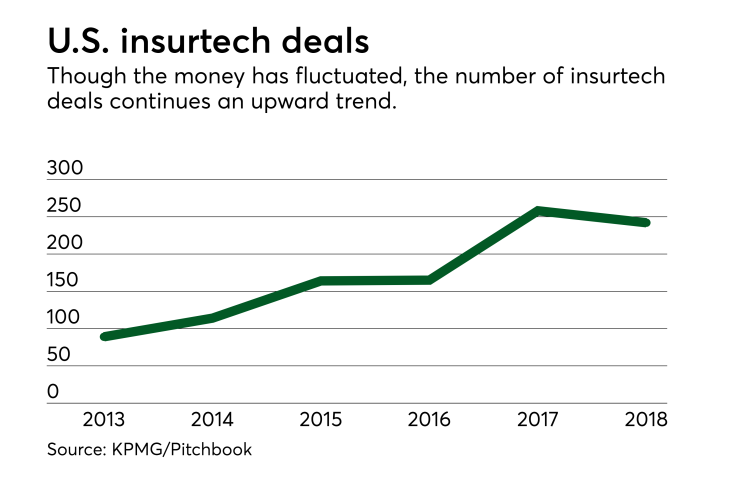As a segment of the larger fintech revolution, the insurtech phenomenon is truly global. But it's in the U.S. where it really shines, according to KPMG.
The firm's newest "Pulse of Fintech" report, a twice-yearly look at financial services digital transformation, notes that insurtech "matured significantly as a sector" in the second half of 2018. There were 13 deals over $100 million over the course of the year, while insurtechs looked to more platform-based approaches to offer white-label services and plug into various distribution networks and payment systems.

Though insurtech deal volume declined in terms of dollars year over year ($10.3 billion to $5.7 billion), there were still more than 240 insurtech deals over the course of 2018, only about a dozen behind 2017. (From 2016 to 2017, deals jumped from a high of 165 to 258.) That indicates that "interest is persisting, but check sizes have taken a breather" as late-stage investors and companies willing to pay a premium become tapped out, KPMG says, citing Pitchbook data.
In the U.S., however, investment in insurtech grew "substantially" in 2018, the company reports. Health insurtechs Oscar and Devoted Health led the way, but usage-based insurance company Root and home and renters' Hippo both clocked in near $100 million.
Outside the U.S., KPMG highlighted work being done between insurtechs and auto companies in Israel as a trend to watch. And, the Monetary Authority of Singapore is working to help develop blockchain solutions for insurance within that country. In fact, Asia is likely to see big insurtech growth, KPMG predicts, "in part by U.S.- and Europe-based traditional insurers looking to use Asia to test alternative offerings" thanks to its lower regulatory requirements, the company says.





